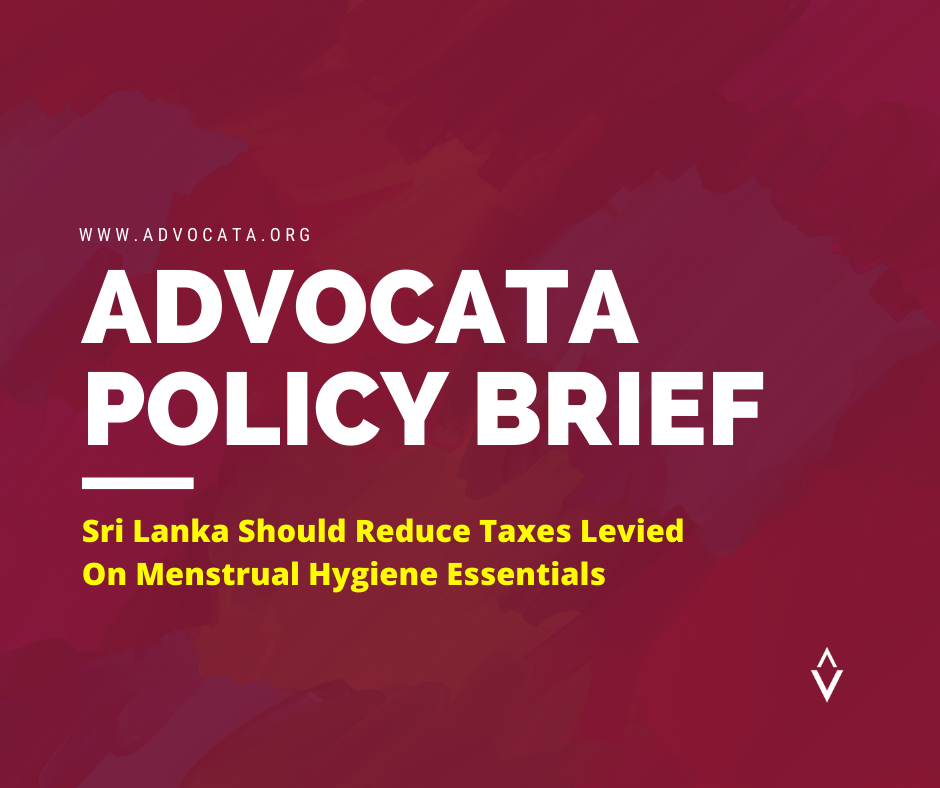Originally appeared on The Morning
By Thathsarini Siriwardana
On 2 October, the President’s Media Division announced that the Government had decided to remove all import duties on imported raw materials for domestically-produced sanitary napkins while providing zero VAT benefits for imported finished sanitary napkins. This is yet to be implemented; no gazette has been issued at the time of writing.
The move to reduce tariffs is positive and doubtless well-intentioned and should be welcomed. These tax revisions will help to reduce the prices of domestically-produced sanitary napkins considerably. Nevertheless, we would have liked to see the tariff cuts on sanitary napkins as part of a broader overall reform of the tariff structure rather than an ad hoc adjustment.
Women constitute just over half of Sri Lanka’s population of 21 million. Of the female population, 5.3 million menstruate. Menstrual products had high tariffs prior to 2018. The total tariff imposed on sanitary napkins was over 101.2% [1] in 2018, but these were gradually reduced.
The current total tariff on sanitary napkins is 46.9% [2]. Although the current tariffs are much lower, they are still quite high, so access to affordable and safe menstrual products remains a luxury for some women.
The collapse of the currency and soaring inflation have brought a lot of pressure on household budgets. The Government should try to reduce inflationary pressure through supply-side reforms. Simplifying and standardising the tariff structure will facilitate trade and can reduce costs.
Sanitary napkins are vital for girls and women. High protective tariffs imposed on these products benefit producers, but this is at the expense of consumers. The inability to afford sanitary napkins in Sri Lanka is pervasive, especially among the low-income segment of society.
Tariffs on menstrual hygiene products
It is clear that in terms of tariffs on menstrual hygiene products, such policy decisions benefit producers. The current total tariff of 46.9% consists of 15% (VAT) + 10% (PAL) + 15% (CESS) [3] and while this is an improvement, prices are still high.
When a protectionist tariff is placed on a good, it will achieve two main things. First, it will act as a barrier for new products entering the domestic market. This lowers competition and reduces the choice available to women when purchasing sanitary napkins. Secondly, high tariffs trickle down to final product prices, resulting in higher prices for both domestically-produced and imported products.
Sri Lankan women and girls face challenges in choosing a menstrual hygiene product that best suits them. The ability to choose comes with the affordability and the availability of the product. The current high tariff rates hinder the choice of women and girls.
By reducing tariffs, the cost of importing products will decrease while simultaneously creating competition, which will help to reduce the prices. This will encourage new local producers to innovate better quality products while ensuring their prices remain low and competitive in the market.
Cost analysis of sanitary napkins
A market price analysis of sanitary napkins shows that the average imported price per pad remained more expensive than the most expensive locally-produced price per pad as of September 2022. The currently available cheapest price per pad is Rs. 33. When comparing per-pad price changes within a year, it shows that both prices of local and imported brands have increased by more than 70%.
Economic factors such as the depreciating exchange rate and high rates of inflation are the main contributors to this vast price increase. The increasing prices are also influenced by the high para-tariffs. Removing the imposed protectionist tariffs on sanitary napkins and menstrual hygiene products will provide some degree of relief for low-income-earning women.
Advocata Institute reported that in 2016 Sri Lanka’s absolute household period poverty rate was approximately 50%. This means that around half of the households with menstruating women do not report buying sanitary napkins as part of their household expenditure. In 2019, Sri Lanka’s absolute household period poverty rate was approximately 40%. Even though this is an improvement compared to 2016, the situation is expected to worsen due to the economic crisis.
To provide relief, the Government should also focus on removing the PAL (10%) and the CESS (15%) imposed on imported sanitary napkins. This will allow competition to enter domestic markets while providing cheaper and healthier options for women.
Necessary tariff structure reforms
The Sri Lankan tariff structure is complex, disorganised, and comprises a combination of multiple para-tariffs and duties. The current protectionist import tax structure has significant negative effects on exports as well as the domestic economy.
The International Monetary Fund (IMF) in its Article IV consultation in 2021 stated that high para-tariffs hindered competitiveness and growth [4]. This clearly shows that immediate reforms should be carried out on the Sri Lankan tariff system.
To begin with, the existing Customs duty and excess para-tariffs such as PAL, VAT, CESS, surcharge, etc. should be unified into a single Customs duty. For a simpler tariff system, a single rate should apply across all categories where possible, within each HS code. A uniform tariff rate should apply for raw materials and components of the industry [5].
Sri Lanka has been a member of multiple international organisations such as the World Trade Organization (WTO) since 1955, the General Agreement on Tariffs and Trade since 1948, and the IMF since 1950, due to which we have to reaffirm commitments to the multilateral trading system. As members of these organisations, we have to adhere to their protocols and commitments to reducing barriers to international trade by eliminating or reducing tariffs and quotas.
Thathsarini Siriwardana is a Research Assistant at the Advocata Institute. She can be contacted at thathsarini.advocata@gmail.com. The Advocata Institute is an Independent Public Policy Think Tank. The opinions expressed are the authors’ own views. They may not necessarily reflect the views of the Advocata Institute.



